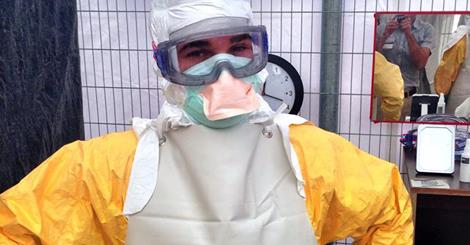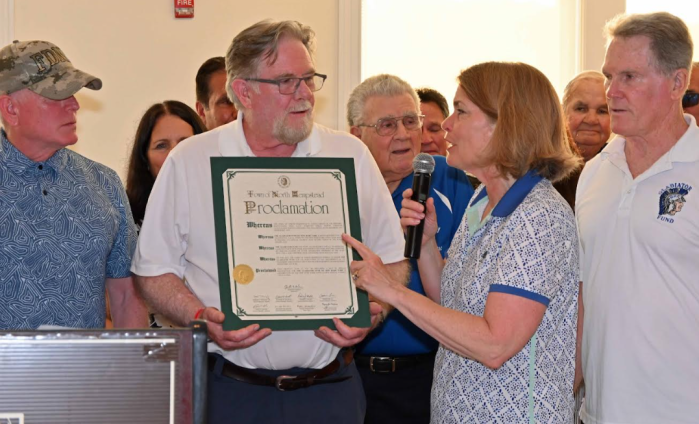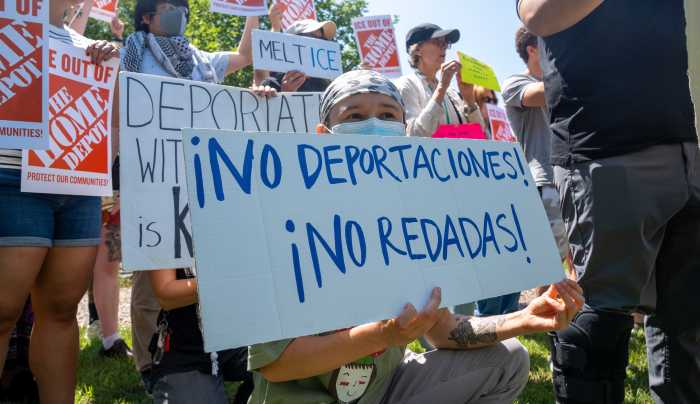
One day after a New York City doctor became the first in the state to be diagnosed with Ebola, officials ramped up their efforts to calm nerves of New Yorkers fearful of the disease, while also taking the dramatic step of issuing mandatory quarantines at local airports for travelers who may have been exposed to the disease in West Africa.
The anxiety over Ebola also reached Suffolk County, where health officials announced that they will be conducting daily monitoring of two people who recently traveled to Guinea, and who are the parents of a student who attends John Pearl Elementary School in Bohemia. An alert prompted some parents to pull their kids out of classes on Friday. The parents have decided to keep their child out of school for 21 days, the maximum incubation period for the disease, school officials said.
“This child has had absolutely no symptoms of Ebola nor do the relatives,” school officials said on a statement posted on its website. “The parents have kindly taken this step to help calm the concerns of other parents and to ensure that there is no interruption in the education of the other students at the elementary school. We are all very grateful for the enormous sensitivity and consideration this family has shown the Connetquot Central School District community. Our school community should make every effort to show this family our appreciation.”
The parents were evaluated by the U.S. Centers for Disease Control after arriving at John F. Kennedy International Airport, but displayed no symptoms and were allowed to go home, Suffolk health officials said. The Suffolk County Department of Health Services will conduct daily monitoring of the couple until the 21-day incubation period expires, officials said.
“There are currently no reports of any individual in Suffolk County who has displayed any symptoms of Ebola,” Suffolk County health commissioner James L. Tomarken said.
In New York City, the push for calm began in earnest Friday afternoon when Mayor Bill de Blasio told New Yorkers “there is no cause for alarm.”
“New Yorkers need to understand the situation is being handled and handled well,” de Blasio said during a press conference. “It cannot be transmitted through casual contact,” he added, “it cannot be transmitted in airborne fashion.”
Gov. Andrew Cuomo also wasted no time. Before most New Yorkers settled in to work, he had already appeared on NBC’s “Today Show,” CNN’s “New Day,” and CBS “This Morning.”
Later in the day, Cuomo took the MTA’s 1 train for a public appearance with New Jersey Gov. Chris Christie to announce increased screenings at John F. Kennedy International and Newark Liberty International airports—two of five airports in the country that have been screening passengers arriving from Liberia, Guinea and Sierra Leone.
The stepped-up measures include a mandatory 21-day quarantine for anyone who came in direct contact with Ebola patients or medical personnel in any of the three Ebola-stricken West African nations.
“The steps New York and New Jersey are taking today will strengthen our safeguards to protect our residents against this disease and help ensure those that may be infected by Ebola are treated with the highest precautions,” Cuomo said.
Meanwhile, the city deployed a team of medical detectives to find anyone who may have came in contact with Dr. Craig Spencer, the 33-year-old diagnosed as the state’s first Ebola patient. He had recently arrived home from treating Ebola patients in West Africa. He had reported feeling fatigued and recorded a high fever. Officials retracted an earlier statement that said Spencer’s temperature was 103 degrees; it was actually 100.3.
Spencer had returned through JFK airport on Oct. 17. He went through proper screening methods at the airport but displayed no symptoms until Thursday, officials said. Between that time, he had traveled on the subway and went bowling.
Officials spent most of the day reminding people that the only way to contract Ebola is through direct contract with a patient or their bodily fluids. It is not an airborne disease. Such patients are only communicable once they’re showing symptoms of the virus.
The state on Friday also launched an 24-hour information help-line to answer public health questions. The number is 1-800-861-2280. If anyone requires medical attention, officials urge them to call their health care provider or 911.

































